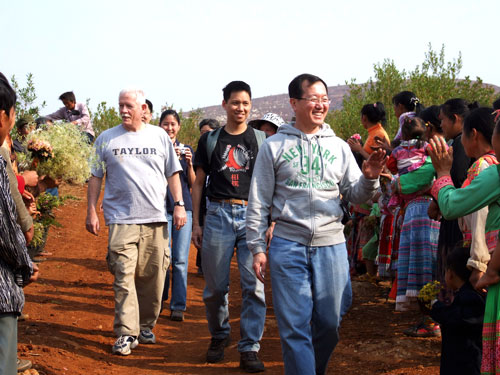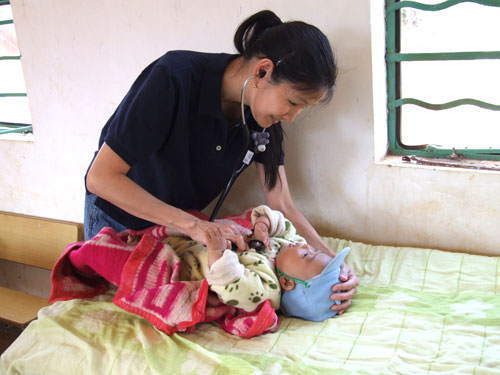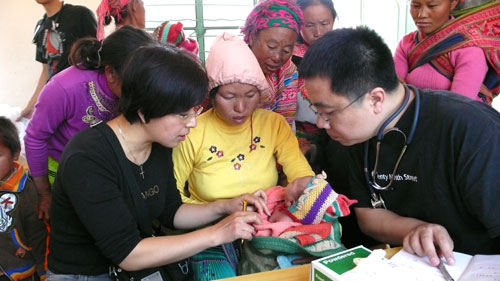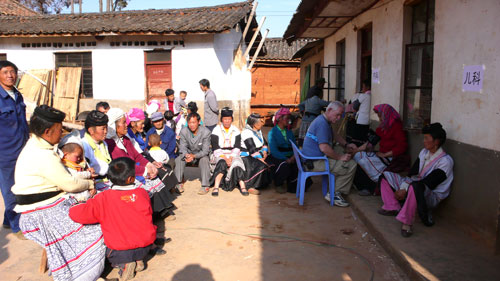Brotherly Medical Activity Zhangpojiao.
On March 27, 2008 A U.S medical team reached Kunming to perform a completely free medical mission with ethnic minorities of the province of Yunnan (China). Among them were specialists in general medicine and pediatrics, and a group of translators, forming a team of 5 people. These physicians use their vacation time, they themselves pay for their own travel and brought 5 large boxes of drugs purchased also by themselves. The project included medical care in three locations of Honghe Prefecture, near the city of Kaiyuan: Zhangpojiao, Fuming and Jinyin. Also participating in this activity three Dominican sisters from Taiwan.

To save time, the same day they arrived, at 2 pm, we formed a group of 12 people all together and left for the city of Kaiyuan, southeast of Yunnan. After a restful night, we went towards the Miao village of Zhangpojiao, where we arrived after about two hours driving through mountain roads full of potholes. All the villagers were waiting, in fact they had been waiting already for a long time. They had taken a variety of wildflowers and as soon as they saw the first car, surrounded us to shake our hands and to offer bouquets of all colors. Thus, between songs and surrounded by all of them, we arrive at the playground of our Daoming primary school. None of them wanted to separate from us.
How we like to hear their beautiful voice and see their warm smile! But we are in a race against the clock so that doctors can see the maximum number of patients, so we started immediately to work. We prepared two consultation rooms in classrooms to monitor blood pressure to all villagers. We asked the patients to come accoding to a list we had prepared already and to which Zhangpojiao residents had registered previously. Afterward, patients received the results of this first analysis and que to the next test. At one point, the input queue in classes had become two long dragons. Inside, doctors carefully examined everybody. Each physician had two or three translators: English, Chinese, Hmong (language of the Miao minority), so we can say that language barriers were the main obstacle affecting the speed of the medical mission. Nobody cared to rest even for drinking water. And so the visit lasted until 2 in the afternoon, when we stopped to eat. The food was extremely simple: a box of precooked noodles each. After lunch, the medical team went to visit some Zhangpojiao houses, where they could see the situation of extreme poverty in which they live. This reaffirmed their commitment to assist the people of Zhangpojiao.

After visiting the village, doctors immediately began working again. The pediatrician's name is Elisa and comes from Hawaii. She is young and very pretty. Her table is full of medical instruments and small colored stickers. When she is going to examine a child, first she let the kid choose the colored sticker he likes best and then she helps them to stick them on their baby clothes or in their hands. That is why children let her examine them without any difficulty. When giving medicines to children, first patiently explains to parents how to use them, and even makes them a demonstration of how to do it. Villagers receive the medicines they need for free and the children, seeing the joy of his parents and medicines packaged like candy, they are also very happy.

Most patients came to the general medicine clinic. Many were older people that, due to a hard life and poverty, already have chronic diseases. The doctor leading the inquiry, Dr Ho, this is the third time that performs medical missions in Yunnan, so he has a lot of experience. He is a Doctor of U.S. Air Force, and has much prestige. He is a hard worker: he personally prepares urine tests to patients. Some patients require injections, but they are so dirty that Dr. Ho has to patiently clean them more than 10 times before giving them the injection. There was one patient who complained of pain in the foot. Right there he took off his rubber boots. When Dr. Ho raised his foot to examine him, I could see his face full of surprise, eyes wide open and unable to say a word. I went to have a look: the reason for the pain is that he did not cut his toenails already for several years, so they had grown already more than 3 or 4 cm. and also had curled. More alarming is that the nails had a large amount of "something" black below. I thought Dr. He would immediately lower the patient's foot, but it was not so. Instead he lifted to foot even more so he could examine it more closely, and examined each finger and each nail carefully and then gave his appropriate medicines. All the villagers were given the free medicines they needed. Some of them immediately took them and said they had never taken drugs as good, especially children, because their medicines were nice and sweet.
Consultations continued until 6 pm, no time to rest. The doctors were tired, their eyes red, and finally, one of the translators told us: "These doctors have just arrived from America and have not had time to acclimate to the new schedule. They must stop now for the sake of health care. " Normally it takes at least 3 or 4 days to acclimate the body to the time difference, but they, after more than 20 hours by plane and more than 300 km. of mountain roads, have not had time to breathe. I felt guilty and I felt inhuman and cruel. However, Dr. Ho said clearly: "Do not look at the clock. From here we do not leave until we've seen the last sick person. " I can not describe what I felt my heart to hear these words! And so we continue until we saw the last patient. It was already 8pm.

It's time to say goodbye to all the villagers, who were waiting outside. As we left, all surrounded us: some gave us warmly their hands as we said a few sentences of thanks, we hugged each other without being able to say a word, many followed us because they did not want us to leave, the children clung to our clothes while crying, elders made the sign of the cross in silence, and many men cleaned the tears from her eyes with the sleeves while the women were constantly putting their hands in the nose. The phrase I heard most often was: "May the peace of the Lord be with you"!
Night was falling and the sky was bright and our spirits were filled with love!
In places where there is no hope, we will bring hope!




